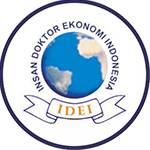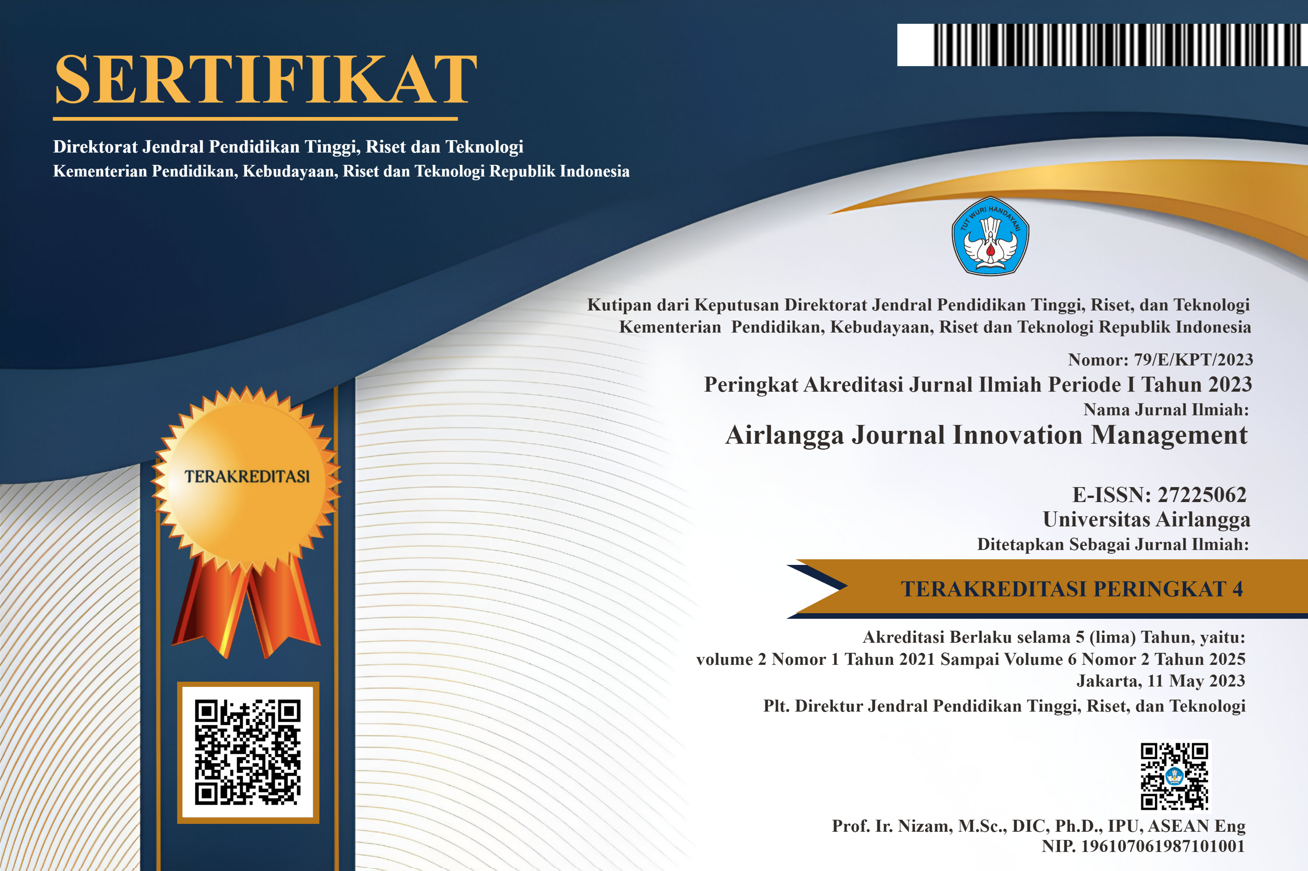DETERMINANTS OF THE INTENTION TO PARTICIPATE IN WAQF: ALTRUISM, TRUST, AND RELIGIOSITY
Downloads
This study aims to determine community groups' behavior in participating in waqf. One of the motives that waqf marketers must capture is altruistic behavior in waqf. Altruism is a feeling of wanting to prosper others so that personal interests are sometimes not always important. The feelings of people who always want to help others must be seen and converted into one of the marketing tools in the future. Religiosity is proposed as a moderation of one's altruistic nature in participating in waqf. This study uses the Partial Least Square – Structural Equation Model (PLS-SEM) model, with a total of 61 active waqf in Indonesia. The main finding revealed that altruism significantly affected trust, although it did not affect the intention to participate in waqf. Another significant result reveals that Islamic religiosity moderates the effect of altruism on the intention to participate in waqf if the customer (wakif) has felt trust. In this case, someone with a higher level of religiosity has a greater intention to participate in waqf compared to those with lower religiosity. The significant contribution of this research is the developed theory about the relationship between altruistic attitude, belief, and intention to participate in waqf. This study also recommends practitioners making marketing strategies (segmentation-targeting-positioning) that use customer journeys in altruistic and religious programs. The marketing program is structured in order to find the interest of new wakif candidates as well as to prove credibility so that it will gain trust and in the end will increase a person's intention to participate in waqf.
Ab Shatar, W. N., Hanaysha, J. R., & Tahir, P. R. (2021a). Determinants of cash waqf fund collection in Malaysian Islamic banking institutions: empirical insights from employees' perspectives. ISRA International Journal of Islamic Finance, 13(2), 177–193. https://doi.org/10.1108/IJIF-06-2020-0126
Ab Shatar, W. N., Hanaysha, J. R., & Tahir, P. R. (2021b). Determinants of cash waqf fund collection in Malaysian Islamic banking institutions: empirical insights from employees' perspectives. ISRA International Journal of Islamic Finance, 13(2), 177–193. https://doi.org/10.1108/IJIF-06-2020-0126
Adhiatma, A., & Fachrunnisa, O. (2021). The Relationship among Zakat Maal, Altruism and Work Life Quality. International Journal of Zakat, 6(1), 71–94. https://doi.org/10.37706/ijaz.v6i1.255
Ascarya, Rahmawati, S., & Sukmana, R. (2017). Cash waqf models of BMT in Indonesia. In Al-Awqaf: Jurnal Wakaf dan Ekonomi Islam (Vol. 10, pp. 115–126).
Baqutayan, S. M. S. (2020). What determine the givers behavior? The mindset of waqf giver in Malaysia. Sociology International Journal, 4(1), 17–23.
Cao, X., Yu, L., Liu, Z., Gong, M., & Adeel, L. (2018). Understanding mobile payment users' continuance intention: a trust transfer perspective. Internet Research.
Cooper, D. R., Schindler, P. S., & Sun, J. (2014). Business research methods. Business research methods. New York, NY: McGraw-Hill/Irwin.
Diebner, R., Silliman, E., Ungerman, K., & Vancauwenberghe, M. (2020). Adapting customer experience in the time of coronavirus. McKinsey & Company, 2.
Eisenberg, N., Miller, P. A., Schaller, M., Fabes, R. A., Fultz, J., Shell, R., & Shea, C. L. (1989). The role of sympathy and altruistic personality traits in helping: A reexamination. Journal of Personality, 57(1), 41–67.
Faizi, R. N., Lubis, D., & Mahanani, Y. (2021). Determinant of Cash Waqf Donation in DKI Jakarta. Badan Wakaf Indonesia.
Faruq, H. A. (2011). How institutions affect export quality. Economic Systems, 35(4), 586–606.
Haidlir, B. M., Laksmono, B. S., Kasri, R. A., Azizon, A., & Hartono, D. (2021). Public Behaviour on Cash Waqf: Evidence from Indonesia. Jejak, 14(2), 316–332. https://doi.org/10.15294/jejak.v14i2.32032
Hair Jr, J. F., Sarstedt, M., Hopkins, L., & Kuppelwieser, V. G. (2014). Partial least squares structural equation modeling (PLS-SEM): An emerging tool in business research. European business review.
Hasan, S. (2011, December). Role of waqf in enhancing Muslim small and medium enterprises (SMES) in Singapore. In 8th International Conference on Islamic Economics and Finance, Qatar (pp. 1-50).
Hazami, B. (2016). Peran dan aplikasi wakaf dalam mewujudkan kesejahteraan umat di Indonesia. Analisis: Jurnal Studi Keislaman, 16(1), 173–204.
Kasdi, A. (2018). Dinamika Pengelolaan Wakaf di Negara-Negara Muslim. ZISWAF: Jurnal Zakat Dan Wakaf, 4(1), 73–86.
Kashif, M., Zarkada, A., & Thurasamy, R. (2017). The moderating effect of religiosity on ethical behavioural intentions: An application of the extended theory of planned behaviour to Pakistani bank employees. Personnel Review.
Khuwarazmi, A., Mulyani, S. S., & Insani, A. M. (2021). Analysis Of Community Cash Waqf Intention To Support Sustainable Development Goals (SDGs): Theory Planned Behaviour Approach. Airlangga International Journal of Islamic Economics and Finance, 4(1). https://doi.org/10.20473/aijief.v4i1.26383
Kline, B., & Tamer, E. (2016). Bayesian inference in a class of partially identified models. Quantitative Economics, 7(2), 329-366.Malhotra, N. K. (2015). Essentials of marketing research: A hands-on orientation. Pearson Essex.
Mansbridge, J. J. (1990). Beyond self-interest. University of Chicago Press.
Meer, J. (2014). Effects of the price of charitable giving: Evidence from an online crowdfunding platform. Journal of Economic Behavior & Organization, 103, 113–124.
Mukhtar, A., & Butt, M. M. (2012). Intention to choose Halal products: The role of religiosity. Journal of Islamic Marketing, 3(2), 108–120. https://doi.org/10.1108/17590831211232519
Pitchay, A. A., Thaker, M. A. M. T., Mydin, A. A., Azhar, Z., & Latiff, A. R. A. (2018). Cooperative-waqf model: a proposal to develop idle waqf lands in Malaysia. ISRA International Journal of Islamic Finance.
Qolbi, A., & Sukmana, R. (2022). Determinan Niatan Mahasiswa Terhadap Wakaf Tunai Secara Online Menggunakan Modifikasi Technology Acceptance Model. Jurnal Ekonomi Syariah Teori Dan Terapan, 9(1), 78. https://doi.org/10.20473/vol9iss20221pp78-91
Qurrata, V. A., Seprillina, L., Narmaditya, B. S., & Hussain, N. E. (2020). Media promotion, Islamic religiosity and Muslim community perception towards charitable giving of cash waqf. International Journal of Monetary Economics and Finance, 13(3), 296–305.
Rodriguez-Ricardo, Y., Sicilia, M., & López, M. (2019). Altruism and internal locus of control as determinants of the intention to participate in crowdfunding: the mediating role of trust. Journal of Theoretical and Applied Electronic Commerce Research, 14(3), 1–16.
Sargeant, A., & Lee, S. (2004). Trust and relationship commitment in the United Kingdom voluntary sector: Determinants of donor behavior. Psychology & Marketing, 21(8), 613–635.
Shukor, S. A., Anwar, I. F., Aziz, S. A., & Sabri, H. (2017). Muslim attitude towards participation in cash waqf: Antecedents and consequences. International Journal of Business and Society, 18(S1), 193–204.
Soemitra, A. (2010). Bank dan lembaga keuangan syariah.
Song, Y., Wu, H., Ma, J., & Lu, N. (2019). Exploring the dynamic influences and interaction effects of signals on backers' investment in the crowdfunding market. Information Technology & People.
Susanto, A., Suharyono, S., Musadieq, M., & Iqbal, M. (2021). Determinant Factors of Donation Intention and the Role of Religiosity: A Case Study in Indonesia. The Journal of Asian Finance, Economics and Business, 8(5), 1155–1169. https://doi.org/10.13106/jafeb.2021.vol8.no5.1155
Sutarso, Y. (2022). The Role of Islamic Religiosity on the Relationship Between Risk , Trust , and Intention to Use Digital Payments During the COVID-19 Pandemic. International Journal of Islamic Economics and Finance (IJIEF), 5(July), 177–200.
Syafira, F. N., Ratnasari, R. T., & Ismail, S. (2020). the Effect of Religiosity and Trust on Intention To Pay in Ziswaf Collection Through Digital Payments. Jurnal Ekonomi Dan Bisnis Islam (Journal of Islamic Economics and Business), 6(1), 98. https://doi.org/10.20473/jebis.v6i1.17293
Syahrir, A., Rahem, A., & Prayoga, A. (2020). Religiosity of pharmacy students of UIN Malang during COVID-19 pandemic. Journal of Halal Product and Research (JPHR), 3(1), 25–34.
Tan, M., & Teo, T. S. H. (2000). Factors influencing the adoption of Internet banking. Journal of the Association for Information Systems, 1(1), 5.
Taylor, S. E., Van Lange, P., Kruglanski, A. W., & Higgins, E. T. (2012). Handbook of theories of social psychology.
Utomo, H. S. (2020). The effect of Muslim religiosity and innovation capability on firm survival: A study on small enterprises during the Covid-19 pandemic. Iqtishadia, 13(2), 179–196.
Zauro, N. A., Saad, R. A. J., Ahmi, A., & Hussin, M. Y. M. (2020). Integration of Waqf towards enhancing financial inclusion and socio-economic justice in Nigeria. International Journal of Ethics and Systems.

This work is licensed under a Creative Commons Attribution-NonCommercial-ShareAlike 4.0 International License.
- The journal allows authors to hold copyright without restrictions and retain publication rights without restrictions. The author retains the copyright and grants the first publication rights to the journal, with his work simultaneously licensed under the Creative Commons Attribution-NonCommercial-ShareAlike 4.0 International License (CC BY-NC-SA). This license allows others to share the work with acknowledgment of authorship and initial publication in this journal, provided that the work is not used for commercial purposes and that any derivative works must use the same license.
- Authors may enter into additional contractual agreements for non-exclusive distribution of the journal publication version (e.g., uploading it to an institutional repository or publishing it in book form), while still including acknowledgment of the initial publication in this journal.
- Authors are allowed and encouraged to upload their work online (e.g., in an institutional repository or personal website) before and during the submission process. This can support productive scientific exchanges as well as increase citations to published works.

AJIM by UNAIR is licensed under a Creative Commons Attribution-NonCommercial-ShareAlike 4.0 International License.





















